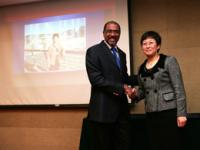 UNAIDS Executive Director, Michel Sidibé with Dr. Zhao Hongxin, winner of the Positive Commitment, Treatment and Care Award in Shanghai, China on 23 November 2009. Credit: UNAIDS
UNAIDS Executive Director, Michel Sidibé with Dr. Zhao Hongxin, winner of the Positive Commitment, Treatment and Care Award in Shanghai, China on 23 November 2009. Credit: UNAIDSUNAIDS Executive Secretary Michel Sidibé arrived in Shanghai this week on the first leg of a two-city visit to China. During the visit, Michel Sidibé will visit Shanghai and Beijing, launch the 2009 AIDS Epidemic Update and meet with many key partners from Chinese government and civil society. Michel Sidibé began his visit by attending a prize giving ceremony organised by the China office of the International Treatment Preparedness Coalition, an organization that works to improve treatment conditions for people living with HIV at the local, regional and international levels.
During the ceremony, prizes were awarded to civil society figures, medical workers, government officials and organizations that have made exceptional contributions to the response to AIDS in China, in the fields of community mobilization, treatment and care, and policy implementation.
Dr Cai Weiping, a doctor renowned for his work with people living with HIV, was awarded a prize for his contributions to treatment and care. Accepting the prize, Dr Cai said “I have received many awards in 26 years of being a practising physician, but this is the first prize I’ve ever received from the community, or from my patients. The best recognition that a doctor can receive is not from the government or from a hospital, but from his patients.”
When I was listening to the people who have been working hard, giving voice to the voiceless, I feel like it is not just about receiving an award, it’s about saving lives, it’s about giving social justice, it’s about redistributing opportunity.
Michel Sidibé, UNAIDS Executive Director
Michel Sidibé highlighted the importance of the dedication shown by prize recipients: “I think what we are talking about today is restoring dignity,” Michel noted, “When I was listening to the people who have been working hard, giving voice to the voiceless, I feel like it is not just about receiving an award, it’s about saving lives, it’s about giving social justice, it’s about redistributing opportunity.”
After presenting awards at the ceremony, Michel Sidibé met for lunch with workers and volunteers from local Shanghai civil society organizations. Joining the lunch were representatives from organizations working with a range of key populations, including sex workers, men who have sex with men and transgender people.
Over lunch, Michel Sidibé heard about the issues and difficulties faced by these populations and the organizations which work to support them. Participants felt that civil society could make a far greater contribution to the response to AIDS, both in Shanghai and in China as a whole. Many felt that the Chinese government needed to work more closely with non-governmental organizations (NGOs) and other civil society partners to provide services and gain access to key populations such as sex workers and drug users. These key populations are often highly reluctant to seek services or accept help from government bodies, particularly due to the fact that they are often criminalised, and therefore remain cut off from vital prevention, treatment and care services.
Michel Sidibé discussed these issues and expressed his agreement, stressing the critical importance of NGO involvement in national AIDS responses, including meaningful participation in policy formulation and implementation of prevention, treatment and care services. Michel commended the participants for the work they were carrying out. He told them that “achieving social change and challenging strongly-held attitudes is not an easy task, and requires time, patience and commitment,” but encouraged them to continue to strive to achieve these important goals.




